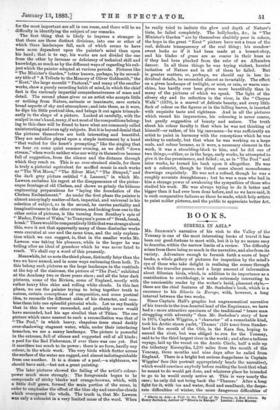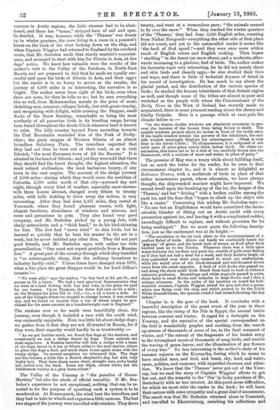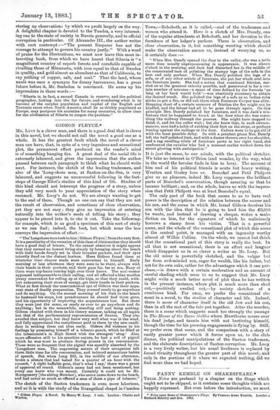BOOKS.
SIBERIA IN ASIA.*
SEESOHH'S narrative of his visit to the Valley of the Yenesay is one of the most interesting books of travel it has been our good-fortune to meet with, but it is by no means easy to describe, within the narrow limits of a review. The difficulty arises from there beingso ranch in the narrative, and also from its variety. Adventure enough to furnish forth a score of boys' books, a whole gallery of pictures for inspection by the mind's eye of those who take delight in realising the scenes through which the traveller passes, and a large amount of information about Siberian birds, which, in addition to its importance as a contribution to ornithology, is made extremely interesting to the unscientific reader by the writer's lucid, pleasant style,— these are the chief features of Mr. Seebohm's book, which is a successor to his Siberia in Europe, with, however, a long interval between the two works.
Since Captain Hall's graphic but ungrammatical narrative of his travels in the iron-hearted land of the Esquimanr, we have had n ) more attractive specimen of the traditional " brave man struggling with adversity" than Mr. Seebohm's story of how in 1876, Captain Wiggins, a "character" of a remarkable kind, took his Arctic steam yacht, Thames' (120 tons) from Sunder- land to the mouth of the Obb, in the Kara Sea, hoping to ascend the river, but was obliged to .run for the Yenesay, said to be the third largest river in the world ; and after a tedious voyage, laid up the vessel on the Arctic Circle, half a mile up the tributary Koorayika, 1,200 miles from the month of the Yenesay, three months and nine days after he sailed from England. There is a bright but serious doggedness in Captain Wiggins' face (his portrait appropriately heads the narrative), which would convince anybody before reading the book that what he meant to do would get done, and whatever place he intended to go to he would surely arrive at. This is very nearly the case ; he only did not bring back the "Thames.' After a long fight for it, with ice and water, flood and sandbank, the despe- rate difficulties of winter, the more dangerous difficulties of &heria in Asia: a Visit to the Valley of the Y moon, in East Siberia. By Henry Seebohni, Author of "Siberia in Europe." London: John Murray.
summer in Arctic regions, the little steamer had to be aban- doned, and there her "bones," stripped bare of sail and spar, lie derelict. It was, however, while the Thames' was frozen up in winter quarters, the crew living in a .room in a peasant's house on the bank of the river looking down on the ship, and when Captain Wiggins had returned to England by the overland route, that Mr. Seebohm made that sturdy mariner's acquaint- ance, and arranged to start with him for Siberia in Asia, at five days' notice. We know how valuable were the results of the author's visit to the Valley of the Petchora, in North-East
Russia, and are prepared to find that he made an equally suc- cessful raid upon the birds of Siberia in Asia, and their eggs; but the reader is in no hurry to arrive at the results, the
journey of 6,000 miles is so interesting, the narrative is so bright. The author never loses sight of his birds, even when there are none, for then he tells us so; but he sees everything else as well, from Mohammedan morals to the price of meat, sketching men, manners, villages; briefly, but with great vivacity, and recognising with delight, while crossing the Steppes, small flocks of the Snow Bunting, remarkable as being the most northerly of all passerine birds in its breeding range, having been found throughout the Arctic Circle wherever land is known to exist. The hilly country beyond Perm ascending towards the Ural Mountains reminded him of the Peak of Derby- shire; the great steppes of Western Siberia of an almost boundless Salisbury Plain. The travellers regretted that they had not time to turn out of their road, so as to visit Irkutsk, "the most European town of All the Russias." It is situated in the heart of Siberia; and yet they were told that there they should find the freest thought, the highest education, the most refined civilisation, the least barbarous luxury, of any town in the vast empire. The account of the sledge journey of 3,000 miles—during which they would cross the meridian of Calcutta, 2,300 miles north of that city—pursued day and night, through every kind of weather, especially snow-storms, with three horses abreast, changed every fifteen to twenty miles, with bells tinkling to drive away the wolves, is very interesting. After they had done 2,431 miles, they rested at Yenesaisk, where they found pleasant rooms, with light, elegant furniture, abundance of windows and mirrors, and roses and geraniums in pots. They also found very good company, and Mr. Seebohm picked up a young Jew, with shady antecedents and a "thick head," to do his bird-skinning for him. The Jew had " never tried " to skin birds, but he
learned so quickly that he beat his master in the art in a week, but he never imbibed any other idea. They did not part good friends, and Mr. Seebohm says, with rather too wide generalisation, " One must not expect gratitude from a Russian
Jew." A great part of the country through which they travelled is "so extravagantly cheap, that the ordinary incentives to industry hardly exist." Unless times have changed since 1876, what a fine place the great Steppes would be for Lord Dillon's tenants !-
" We were able," says the author, "to buy beef at 2d. per lb., and grouse at 7d. a brace. We had a very practical demonstration that we were in a land flowing with hay and corn, in the price we paid for our horses. Up to Tynmain, the three had cost us 6d. a mile ;
on the Steppes the price fell to a id. a horse a mile. At one of the villages where we stopped to change horses, it was market day, and we found on inquiry that a ton of wheat might be pur- chased for the same amount as a hundredweight cost in England."
The stations ever so far north were beautifully clean, the journey, even though it included a race with the south wind, was eminently enjoyable. Here is a little bit about sledge-dogs; we gather from it that they are not ill-treated in Russia, for if they were, their sagacity would hardly be so trustworthy :—
"As we got further north, we found fine dogs at the stations, and occasionally we met a sledge drawn by doge. These animals are most sagacious. A Russian traveller will hire a sledge with a team of six dogs, travel in it ten or fifteen miles to the next station, where he gives the dogs a feed, and sends them home again alone with the empty sledge. On several occasions we witnessed this. The dogs are fine fellows, a little like a Scotch shepherd's dog, but with very bushy hair. They have sharp noses, short, straight ears, and a bushy tail, curled over the back. Some are black, others white, but the handsomest variety is a grey fawn-coloar."
The Valley of the Yenesay is " the paradise of House- Martins," but also the abode of official rascality. If Mr. See- ',ohm's experience be not exceptional, nothing that can be re- sorted to for the purpose of upsetting such a system is to be wondered at. At Krasnoyarsk, the wind beat the travellers, and they had to take to wheels and organise a little caravan. The last
two stages of the journey were travelled with reindeer. They drove
twenty, and went at a tremendous pace; "the animals seemed to fly over the snow." When they reached the winter quarters of the ' Thames,' they had done 3,240 English miles, counting from Nishni Novgorod—everything the other side of that place did not count, and yet to the untravelled reader it seems like the back of God speed !'—and they were once more within reach of English voices and English cooking. Then began
" strolling" in the forest (on snow-shoes), and a moderate, after- wards increasing to a glorious, find of birds. The author makes his favourite topic very interesting, for he did not merely shoot and skin birds and classify eggs,—he also studied their lives and ways, and there is little of technical dryness of detail in his record of investigation. He has much to say about the glacial period, and the distribution of the various species of
birds ; he studied the human inhabitants of that distant region
as well, and though some of the tribes are almost as poor and wretched as the people with whom the Commissioner of the Daily News in the West of Ireland has recently made us acquainted, there is some pleasant reading about the cheery and
kindly Ostyaks. Here is a passage which at once puts the climate before us :-
"In the winter, doable windows are absolutely necessary, to pre- vent the inmates of the houses from being frozen to death. The outside windows project about six inches in front of the inside ones. If the inside window reveals the poverty of the inhabitant, the out- side window seemingly displays his extravagance. !Glass is very dear in the Arctic Circle.] To all appearance, it is composed of one- solid pane of plate-glass, nearly three inches thick. On closer ex- amination, this turns out to be a slab of ice, carefully frozen into the framework, with a mixture of snow and water, in place of putty."
The promise of May was a weary while about fulfilling itself;
but so much the better for the reader, for he owes to that circumstance chapter ix., and it is almost as delightful as Robinson Crusoe, with a multitude of birds in place of that rather monotonous parrot, whose education, we have always
thought, the shipwrecked mariner might have improved. We cannot dwell upon the breaking-up of the ice, the danger of the Thames,' and her " driving " with a broken rudder among the
pack ice, and the floes that " began to climb up the ship's side like a snake." Concerning this mishap Mr. Seebohm says :- " No one but an Englishman would have committed the incon- ceivable blunder of fitting out an Arctic yacht with every precaution against ice, and leaving it with a complicated rudders, exceedingly difficult to replace, and without provision for its being unshipped." Bnt we must quote the following descrip-
tion, just as the excitement was at its height :—
" The revolution in the ice took place to the accompaniment of a perfect Babel of birds. Above our heads we continually heard the `gag-gag' of geese, and the harsh bark of swans, as flock after flock hurried past us to the Tundra. Wherever there was a little open water between the ice-floes and pack-ice, crowds of gulls were fishing as if they had not had a meal for a week, and their derisive laugh, MI they quarrelled over their prey, seemed to mock our misfortunes, while the weird cries of the black-throated and red-throated divers came from the creek opposite. A flock of wild ducks also passed us, and along the shore small birds flitted from bush to bush in hitherto unknown profusion. Bramblings and white wagtails passed in pairs, shore larks in small flocks, and redpoles in large flocks, and I shot a. solitary wheatear. In the midst of his troubles on board his half- wrecked steamer, Captain Wiggins seized his gun and shot a goose, which was flying over the ship, and which proved to be•the Little White-fronted Goose, the species which I had missed shooting the day before."
Chapter ix. is the gem of the book. It concludes with a beautiful description of the great event of the year in these regions, like the rising of the Nile in Egypt, the annual battle between summer and winter. It raged for a fortnight on the Yenesay, and the narrative of the special correspondent on the field is wonderfully graphic and exciting, from the march up-stream of thousands of acres of ice, to the final conquest of winter, and "the retreat of the fragments of his beaten army to the triumphant music of thousands of song-birds, and amidst the waving of green leaves, and the illumination of gay flowers of every hue." No less interesting is the author's story of his summer sojourn on the Koorayika„ during which he seems to have studied man, and bird, and beast, sky, land, and water,- races, politics, and customs, with impartial closeness and atten- tion. We know that the Thames' never got out of the Yene- say, but we read the story of Captain Wiggins' efforts to get her out, and the transfer to the Ibis' (a lucky purchase of Mr.. Seebohm's) with no less interest. At this point arose difficulties,
for which we must refer the reader to the book ; he will learn their nature with some sympathy and a great deal of amusement.. The result was that Mr. Seebohm returned alone to Yenesiesk, and travelled to Ekaterinburg, enriching his collections and
storing up observations by which we profit largely on the way. A delightful chapter is devoted to the Tundra, a very interest- ing one to the state of society in Russia generally, and to official corruption in particular. Of Alexander III., the author writes with curt contempt :—" The present Emperor has not the courage to attempt to govern his country justly." With a word of praise for the illustrations, we must now leave this most in- teresting book, from which we have learnt that Siberia is "a magnificent country of superb forests and cornfields capable of rivalling those of Minnesota, with iron equal to that of Sweden in quality, and gold almost as abundant as that of California, to say nothing of copper, salt, and coal" That the land, whose name was once a synonym for dreary barrenness, has a great future before it, Mr. Seebohm is convinced. He sums up his impressions in these words :—
" Siberia is, in fact, a second Canada in reserve, and the political geographer, looking into the far future, and wondering what is to become of the surplus population and capital of the English and Teutonic races when North America shall be as thickly populated as Europe, may postpone his anxieties for many centuries, to allow time for the civilisation of Siberia to reopen the problem."




































 Previous page
Previous page